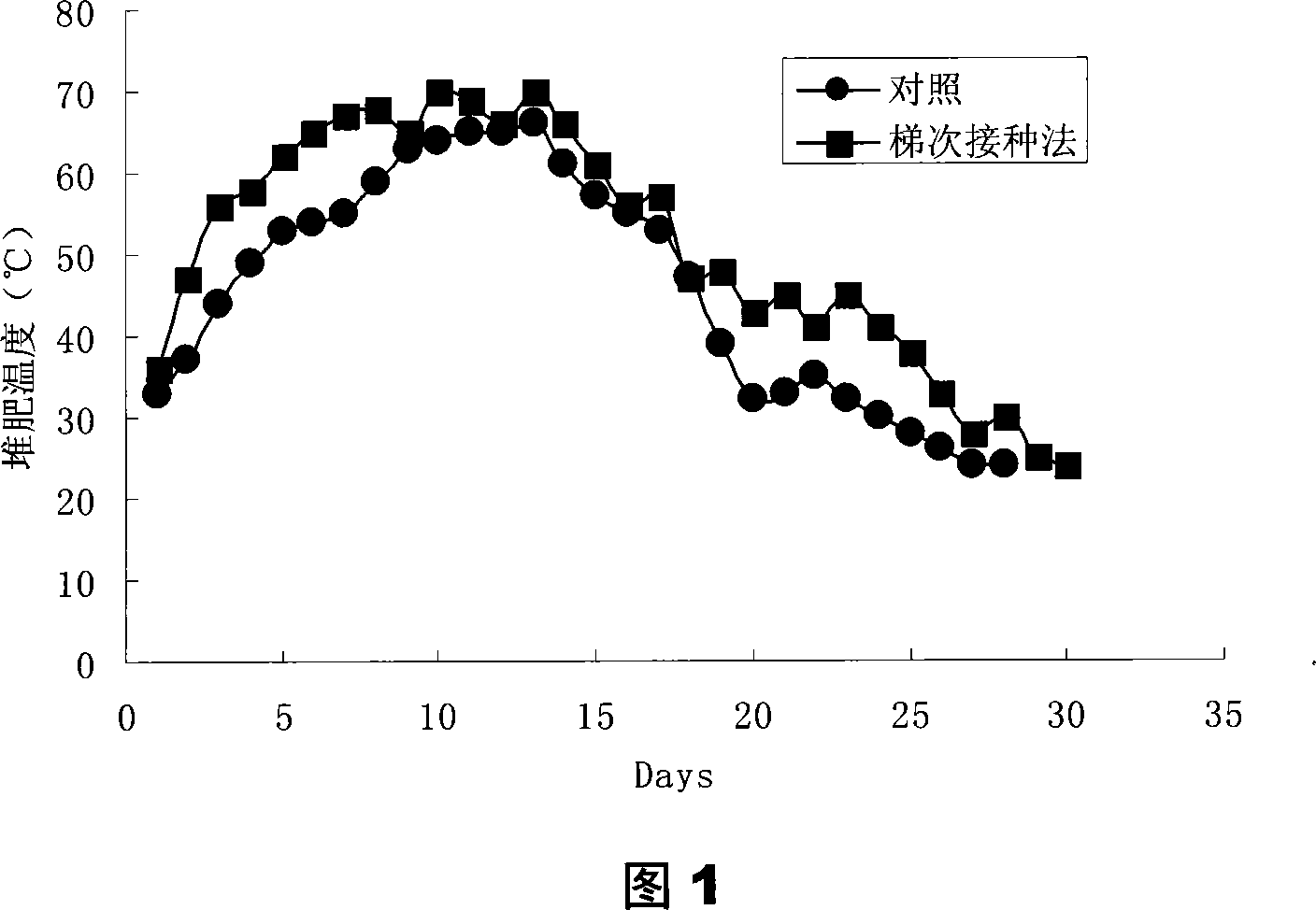Echelon circulation inoculation temperature-control compost method
A composting and step-by-step technology, applied in the preparation of organic fertilizers, organic fertilizers, fertilization devices, etc., can solve the problems of poor pertinence, loss of biological resources, and inability to promote the decomposition of other substances, and achieve the effect of reducing composting costs
- Summary
- Abstract
- Description
- Claims
- Application Information
AI Technical Summary
Problems solved by technology
Method used
Image
Examples
Embodiment 1
[0024] Embodiment 1: the preparation of three different decay-promoting and degrading bacterial agents
[0025] Commercially purchased or obtained the required strains from the relevant microbiological depository institutions, on the corresponding culture medium, the slant activation culture and liquid expansion culture were carried out as usual.
[0026] The slant activation medium used includes PDA medium, nutrient agar medium, Ashubei medium, MRS medium, etc.;
[0027] The liquid expansion culture medium used includes PDA medium (for cultivating mold and yeast), broth medium (for cultivating bacteria), Gaoshi No. 1 medium (for cultivating actinomycetes), MRS medium (for cultivating lactic acid bacteria), etc. .
[0028] After the liquid expansion of different strains is completed, the weight ratio of various microbial culture solutions is directly used as follows:
[0029] Lipolytic bacteria 15~25%
[0030] Amyloliquefaciens 15~25%
[003...
Embodiment 2
[0063] The organic waste raw material consisting of 80% (weight percentage) of cow dung from dairy farms and 20% (weight percentage) of wheat straw is piled up in the form of piles, and the moisture content is controlled at 60% in the initial stage of fermentation.
[0064] a. In the early stage of composting, add the medium and low temperature decay-promoting and degrading bacterial agent directly according to 2% of the weight of the composting raw materials, and carry out composting and fermentation after fully mixing;
[0065] b. When the compost temperature rises to 55-60°C and enters the composting high-temperature period for more than 5 days, directly add thermophilic decay-promoting and degrading bacterial agents according to 2% of the weight of composting raw materials, and continue composting and fermentation after fully mixing;
[0066] c. After entering the compost cooling stage and the compost temperature drops to 30-40°C, add hemicellulose, cellulose, and lignin de...
Embodiment 3
[0077] As described in Example 2, in three different composting stages, during the composting and fermentation process of each stage, a part of the raw materials were taken out as functional bacteria agents for the next round of composting inoculation. The circulating inoculation amount is controlled at 10-20% (percentage by weight). After cyclic reinoculation, there is no need to add new strains for each fermentation, which not only significantly reduces the cost of composting, but also after multiple cyclic reinoculations, due to the more balanced and optimized functional flora, the composting effect is better.
[0078] Table 3 and Table 4 are the actual measurement results of various data after 10 rounds of echelon cycle reinoculation.
[0079] Table 3 The number of microorganisms in the compost after step cycle inoculation
[0080] (unit: cfu / g dry sample)
[0081] Before the second vaccination
[0082] Decomposition effect (1...
PUM
 Login to View More
Login to View More Abstract
Description
Claims
Application Information
 Login to View More
Login to View More - R&D
- Intellectual Property
- Life Sciences
- Materials
- Tech Scout
- Unparalleled Data Quality
- Higher Quality Content
- 60% Fewer Hallucinations
Browse by: Latest US Patents, China's latest patents, Technical Efficacy Thesaurus, Application Domain, Technology Topic, Popular Technical Reports.
© 2025 PatSnap. All rights reserved.Legal|Privacy policy|Modern Slavery Act Transparency Statement|Sitemap|About US| Contact US: help@patsnap.com

